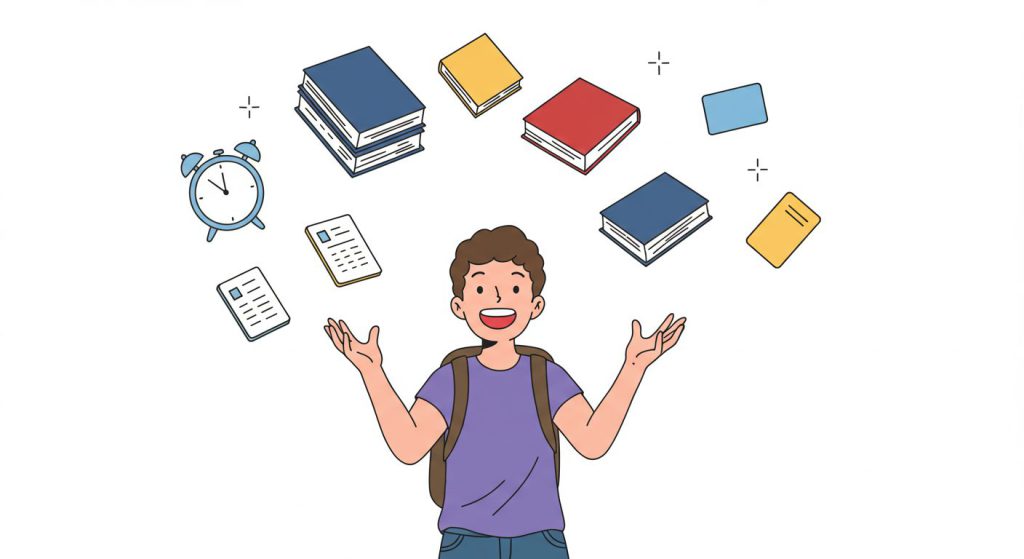We all want to think that cramming will help us pass that test, but what if you could put in less effort and achieve more? Turns out you can do just that. By replacing ineffective methods with modern approaches, you can enjoy the process of learning, reduce stress, and improve your grades simultaneously. In this article, we will discuss nine effective study techniques that will help you work more efficiently. So, are you ready to enhance your study methods? Let’s do it!
1. Take It Apart: Study with Breaks
Does it feel like your brain is inevitably dissolving after endless hours of studying? An overwhelming schedule can be a reason behind that! According to research, studying becomes much easier when done in smaller bursts such as 30-minute sessions over the span of weeks. Information is better processed and memorized in small doses akin to seeds that blossom with time. Set a timer for 25 minutes of focused work followed by 5 minutes of relaxation. This method makes retaining information much easier. How could fragmented study sessions fit into your weekly routine?
2. Give Up Pulling All-Nighters
Cramming feels gratifying, however, all evidence suggests that it’s a terrible idea. Studies tie all nightery to a drop in grades as well as deductive reasoning and memory skills taking a hit for four days. set specific days or weeks when you need to study. Study routines act as a lever for the flexible tools of the brain—one’s perception of effort transforms studying from a task into a pleasant activity. If your brain is perceived as a muscle, it’s clear that steady workouts on a consistent schedule will increase strength, while one prolonged exhausting session will not.
3. Skip Passive Rereading
While going over highlighted notes or rereading textbooks feels productive, it is a waste of time. Research indicates that “passive” rereading does not deepen comprehension or aid in mentally linking key concepts. In fact, it may distract you with some less important details. Instead, attend lectures or discussions where you will have to engage with the material. Quiz yourself, summarize concepts, write reflections, or create mind maps. These techniques demand that your brain works harder, thus “locking in” knowledge. What is one topic you can quiz yourself on today?
4. Embrace Flashcards
Flashcards are not only for children; they are scientifically validated as a memory aid. They serve a bigger purpose, reinforcing learning through tests. En route to a bus stop, within designated study blocks, or on the bus, there is always time for quick revisions. Vocab lists and formulas can be stored in digital decks made by Anki or Quizlet and can even be hand written for all the old school lovers out there. The most important thing is that they must be used consistently. Could they assist you in mastering that challenging subject?
5. Set a Specific Goal for Each Session
Studying without a clear focus is akin to aimlessly wandering. Choose an explicit goal for each of your sessions such as mastering chemical equations, or conjugating verbs in French. This allows for sharpened focus, whilst ensuring progress is tangible.
Write your study goals down clearly before you start. “By the end, I’ll understand X.” Since the explanation has to be clear, if the end result cannot be clearly explained, then you know where you must work on. What is something you hope to achieve in your next study session?

6. Learn by Teaching
Empathize yourself into the challenge of having to explain material thoroughly to someone. This approach is remarkably effective because students who prepare to teach the content always organize the information in a coherent manner and understand better. So, try articulating a concept to a friend, to your pet, or ideally to an imaginary class. For every blunder, you uncover a gap in your understanding, showing the power of teaching in trimming down and linking explanations into coherent ideas that stick. Who remains unexplainable for you? Who in your surrounding could you powerfully” teach” to challenge your understanding?
7. Practice Builds Confidence
Tests that are designed to be taken with the intention of learning widely known as pretests, enhance learning and are not only to be used for prepping. These tools encourage simulation of exam conditions, pinpoint weak areas, and give a sense of confidence. Each time these tests are taken, participants steadily acquire knowledge, making them confident. Research demonstrates that pretests improve the performance of people by increasing the chances of memory retrieval and decreasing anxiety. Invest in crafting your own quizzes or search online for your subject. How often do you foresee yourself having time to take a short pretest?
8. Create A Study Sanctuary
Always consider the physical environment as one of the possible factors when things are unproductively slow.
Study-driven behavior indicates that having a specific area free from destruction, adequately fitted with all study materials, energizes the mind. Students should not do their homework on the bed, or anywhere that is disorderly, chaotic and crowded. It needs to be a quiet desk, or a calm and quiet place in the library. The ‘study sanctuary’ helps send signals to student’s minds that it’s time to start learning new material. Don’t have an ideal location? A neat, uncluttered corner of the room will suffice. So, how do you unlock a place to study?
9. Eliminate All Forms of Distraction
Your high concentration workout session may still be ruined by music, especially if it’s a work-specific mix. Some people find music, especially classical music, helpful during concentration but sleek pop and lo-fi beats have proved to bring a decline in focus right now. And let’s not even get started with phones because those devices are the worst thing ever for concentration. Mute alerts and use apps that disable certain functions during study times, your brain will truly relax. What is something you can get rid of today that isn’t productive?
Key Takeaways
- Short bursts retain more than marathon sessions.
- Avoid cramming to protect memory and reasoning.
- Skip rereading and engage actively with material.
- Use flashcards for powerful memory reinforcement.
- Set goals to stay focused and measure progress.
- Teach others to deepen your understanding.
- Practice tests boost confidence and performance.
- Designated spaces prime your brain for studying.
- Eliminate distractions like music and phones for better focus.
Conclusion
Studying smarter doesn’t mean following a rigid playbook—it’s about finding what clicks for you. These strategies, backed by science, offer a roadmap to better grades and less stress, but you get to choose how to make them your own. Maybe you’ll start with flashcards or carve out a study nook. Whatever you try, trust that small changes can lead to big wins. So, take a deep breath, pick one tip, and give it a whirl. Your future self will thank you!
